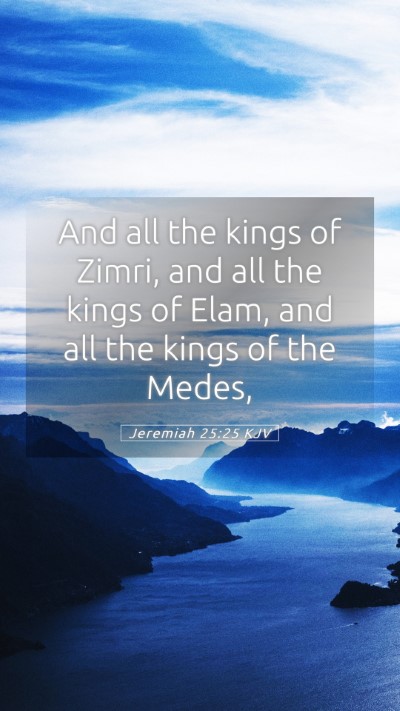Bible Verse Commentary: Jeremiah 25:25
Bible Verse: Jeremiah 25:25 states, "And all the kings of Zidon, and the kings of Tyre, and the kings of the isles which are beyond the sea."
Understanding the Verse
This verse is part of a larger context in which the prophet Jeremiah conveys God’s message concerning the judgement that is to come upon various nations. Jeremiah addresses the kings of Tyre and Sidon, cities infamous for their prosperity and idolatry. The mention of "the isles which are beyond the sea" also indicates a broader scope of judgment that extends to distant lands.
Historical Context
During Jeremiah’s time, Tyre and Sidon were chief cities of the Phoenicians, known for their trade and maritime prowess. Their distant alliances and interactions with Israel made them significant figures in the geopolitical landscape of the time. Jeremiah's prophecy serves both as a warning and a declaration of God's sovereignty over all nations.
Bible Verse Meanings and Interpretations
The essential meaning of Jeremiah 25:25 highlights God’s authority over nations and the inevitable nature of divine judgement. Matthew Henry notes that the mention of these kings signifies the totality of judgment, implying that no one is exempt from God’s decree. Albert Barnes expands on this, asserting that the judgment will encompass both local and distant powers, thus reflecting the global reach of God’s judgment. Adam Clarke emphasizes the idolatrous practices of these nations and the consequent divine retribution that they have brought upon themselves.
Detailed Commentary from Public Domain Sources
- Matthew Henry: His commentary asserts that the kings of Tyre and Sidon, despite their earthly power, stand accountable before God. Their false worship and moral corruption make them subjects of divine wrath.
- Albert Barnes: Barnes connects this verse to the broader theme of God's judgment against nations for their sins, focusing on how the "kings of the isles" represent those who have strayed from God’s laws.
- Adam Clarke: Clarke elaborates on the significance of the geography mentioned, asserting that the reach of God’s judgment is a reminder that all nations and leaders must answer to Him for their actions.
Cross References
- Isaiah 23:1-18: A prophecy concerning the fall of Tyre.
- Ezekiel 26: A lamentation for Tyre and its ultimate destruction.
- Jeremiah 46:10: The day of the Lord's vengeance upon the nations.
- Daniel 2:21: God’s sovereignty in altering the times and seasons.
- Joel 3:2: Bringing nations to judgment for their actions against Israel.
Application and Insights
The application of this verse encourages believers to reflect on the broader implications of God's sovereignty. In understanding Scripture, we recognize that divine judgment is not limited by geography or power structures. Just as the kings of Tyre and Sidon faced accountability, modern leaders and nations must also seek righteousness and justice.
Conclusion
This passage invites individuals and Bible study groups to engage deeply with Biblical exegesis, considering not only the immediate historical context but also its application in contemporary society. Incorporating Matthew Henry, Albert Barnes, and Adam Clarke's insights enhances our understanding of difficult Bible passages, bringing to light the timeless relevance of God’s Word.


